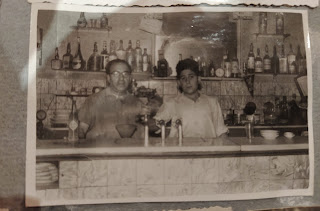Se dice a menudo que la melodía puede ser oída desde mas
lejos que el ruido-y la melodía más fina desde más lejos que la más ruda. Pienso
que hay verdad en esto-y que consecuentemente aquellos acordes del piano que me
alcanzan aquí en mi ático me conmueven mucho más que los sonidos que oiría si
estuviera en el cuarto común-porque son una melodía mucho más pura y divina. Aquellos
que se sientan lejos del ruidoso y frenético mundo no tienen dificultades en
distinguir lo que es dulce y musical, porque solo esto les puede alcanzar. Esto principalmente alcanza la posteridad.
HDT
(Diario 20 de noviembre de 1851)
(traducción Guillermo Ruiz)
“I think
nothing is to be hoped from you, if this bit of mould under your feet is not
sweeter to you to eat than any other in this world, or in any world.”
Pienso que nada puede esperarse de ti si este pequeño trozo
de tierra bajo tu pie no es más dulce para comer que ningún otro en este mundo
o en cualquier mundo
(HDT citado
por Terry Tempest Williams)
La fe no es acerca de encontrar sentido en el mundo, puede que no haya
tal cosa-la fe es la creencia en nuestra capacidad para crear vidas
significativas
Oraciones diarias son proferidas por los labios de las olas
que rompen, los susurros de las hierbas, el reverbero de las hojas.
Durante demasiado tiempo hemos sido seducidos para recorrer
una senda que no conduce a nosotros mismos. Durante demasiado tiempo hemos
dicho sí cuando quisimos decir no. Y durante demasiado tiempo hemos dicho no
cuando desesperadamente quisimos decir sí…
Cuando no seguimos nuestra intuición, abandonamos nuestras
almas. Y abandonamos nuestras almas porque tememos que si no las abandonamos otros
nos abandonaran a nosotros.
"Terry Tempest Williams:
I love Thoreau, and I can’t count the times I’ve read Walden, gone back
to his essays, Civil Disobedience or A Plea for Captain John Brown, and the
word that comes to mind is probity. That quality of having strong moral values,
honesty, decency, I love the word uprightness when I think about Henry. I do
think it is about what is essential, and to be intentional, to be observant, to
be fierce with what one believes, to be a student of nature and a critic of
society. That’s why I keep coming back to Henry, it’s all the times that I
wrote in the margins, “yes, thankyou. So true.”
Steve Paulson: It’s
interesting, all that you just mentioned, it’s integrity about oneself, it’s
passion for the natural world, it’s political justice, it all seems to be bound
up together for him.
Williams: And I think
that’s where my debt to Thoreau is so large. I think it was being 15 years old
at Highland High School in Mrs. Rich’s class where I
first read Walden. Somehow I knew that it was appropriate to read that book
with a green pen; I still have that copy. As I’ve gotten older though the
years, I think it was Thoreau who showed me that environmental issues are
economic issues are issues of social justice. And I think that the genius of
Henry David Thoreau is he saw the world whole, even holy.
Paulson: How did he show
you that environmental issues are also issues of social justice? Where do you
see that in Thoreau?
Williams: Well, I think
when he talks about how we are not the center of the center. And it’s that
quote where he says that the best place for each is where he stands: “I think
nothing is to be hoped from you, if this bit of mould under your feet is not
sweeter to you to eat than any other in this world, or in any world.”If we know
where we are we know who we are. Hejust makes me laugh, I feel like I know him.
And you see remnants, whether it’s Ed Abbey, or, I loved when E.B. White talked
about Thoreau as a regular hair-shirt of a man. Or Emerson’s description of him
physically, with serious blue eyes. I have the feeling that if you were to
spend an hour with Thoreau he would both invigorate you and exhaust you, so
intense were his thoughts and the way in which he walked the world.


